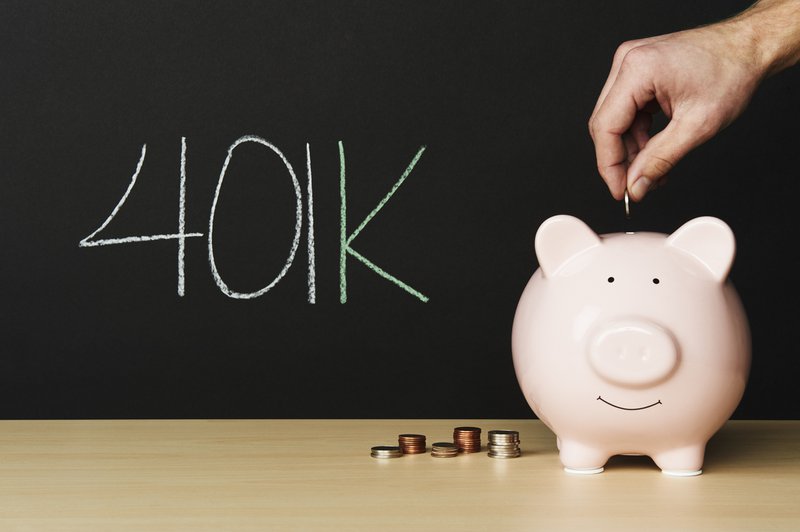
Alexis Rhiannon
May 21, 2020
We've all probably nodded sagely as a friend has described making contributions to their 401(k). But what exactly is a 401(k)? How does it differ from other retirement accounts? And most importantly — how do you get one?
If you're a little unclear on these concepts, you're hardly alone. But since the 401(k) is one of experts' most-recommended retirement accounts, and can often amount to what's essentially free money, it's well worth taking the time to understand it.

What is a 401(k)?
Let's start from the beginning. Named after the section of the US Internal Revenue Code that gave it shape in 1978, the 401(k) plan is a tax-advantaged, employer-sponsored contribution plan.
That's a mouthful, but to break it down, what it basically means is that the 401(k) is a retirement account ("contribution plan") offered through one's workplace ("employer-sponsored"). Depending on what type you have, these accounts incentivize saving for retirement by extending tax breaks on either contributions or withdrawals ("tax-advantaged").
How does it compare to other retirement accounts?
Both you and your employer can contribute to these investment accounts, which distinguishes the 401(k) from an individual retirement account (IRA), an independent account to which the account holder is the sole contributor, and a traditional pension, which defines the benefits that an employer must provide to its employee upon the latter's retirement.
Similar to individual retirement accounts, however, 401(k) accounts come in two different types: traditional and Roth. The difference between these two accounts comes down to when their contributions are taxed. (Because while these accounts are tax-advantaged, that doesn't mean you can avoid paying taxes altogether.)
What are the different types?
For a traditional 401(k), contributions are tax-deferred, meaning they come out of your pre-tax salary and grow tax-free until retirement. And in many cases, these contributions are treated as a deduction from taxable income. (Meaning each contribution effectively decreases your annual salary, thereby lowering both your taxable income and your tax bill.) When you reach retirement age and begin distributions, that's when you'll pay income tax on those funds — based on the tax bracket you occupy at the time of withdrawal.
For a Roth 401(k), the process is essentially switched. Your contributions come out of your after-tax income, meaning you pay income tax on it at the time of contribution, which allows you to withdraw it tax-free later on. This option started out uncommon, but has gained favor in the last few years and should be especially compelling for those who expect to end their careers in a higher tax bracket than the one they currently occupy. Especially because unlike the Roth IRA, there's no income limit that you need to be under in order to contribute — earners at any level can contribute to a Roth 401(k), assuming one is offered through your workplace.
Do I have to choose one or the other?
Nope! The Roth and traditional 401(k) each has its own benefits, so you're welcome to have either or even both — as long as the aggregate amount you contribute doesn't exceed the limits set by the Internal Revenue Service. (More on that shortly.)
And no matter which type of account you opt for, you can invest your 401(k) contributions. Your investment options will depend on what your specific employer offers, but typically include some combination of mutual funds, stocks, bonds, and target-date funds.
How are contributions made?
Another aspect that both types of 401(k)s have in common is the ability to make contributions automatic. Whether it's through automated withdrawals, or salary deferrals that redirect money directly out of your paycheck, your 401(k) is designed to whisk the funds away automatically each month so you never get too attached to the money.
Some companies even offer an employer contribution match, a program designed to incentivize saving for retirement. As long as you, the employee, defer a set percentage of your salary to your 401(k), your employer may commit to matching that amount, up to a certain figure.
To find out whether your company offers matching contributions, speak to your Human Resources representative.
How much can I contribute?
The IRS sets an annual limit for 401(k) contributions, and for 2020, that limit is $19,500 for those under the age of 50. If you're over 50, you're invited to bank an extra $6,500 a year, in an effort to help you boost your savings before retirement.
These caps increase by set amounts every few years, so make sure you're keeping track so you can maximize your contributions.
Who needs one?
Maybe you're thinking you don't need a 401(k) because you already have an individual retirement account. But financial experts actually recommend you have both a 401(k) and an IRA, particularly during your peak earning and saving years.
According to research done by the Investment Company Institute, over one-third of 401(k) plan participants are under 40, so there's no such thing as being too young for these types of accounts. If you have access to one through work, you should absolutely take advantage.
How do I invest in a 401(k)?
Many companies offer auto-enrollment, so it's possible you're already set up with a 401(k) even if you didn't specifically sign up.
To start investing and making the most of your account, you need to make three decisions: the percentage of your salary you wish to contribute, which funds to invest in (look for those with low account management fees and expense ratios), and what percentage of your contributions should go toward each investment.
Once you've done those three things, you can sit back and let the automated withdrawals do their work, knowing you're making the most of your retirement savings.
When can I withdraw my money?
Wherever possible, you should wait until age 59 and a half to begin disbursement on your 401(k), as doing so earlier typically results in penalties of up to 10%, as well as requiring you to pay regular income tax on those funds.
Even if you leave a job, try not to directly cash out your 401(k). Instead, roll it over into a traditional or Roth IRA, accounts which not only offer an array of investment opportunities but also help you avoid hefty penalties for withdrawing the funds early.
That said, these restrictions have been relaxed in the wake of the coronavirus pandemic, with the COVID-19 relief bill lifting the 10% penalty on early 401(k) distributions. So while experts urge that early withdrawals from retirement accounts always should be a last resort, those funds are available to Americans who find themselves in need.
Subscribe to Business Insider's Financial Insights Newsletter
This Business Insider article was legally licensed by AdvisorStream


